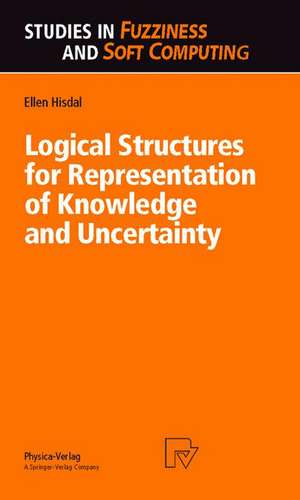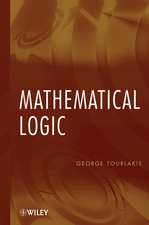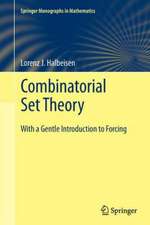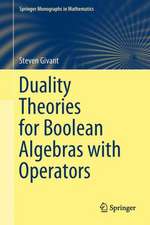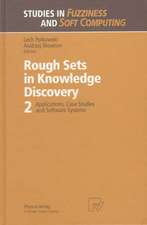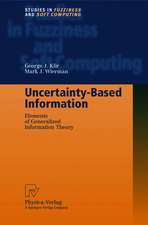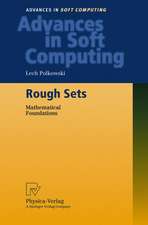Logical Structures for Representation of Knowledge and Uncertainty: Studies in Fuzziness and Soft Computing, cartea 14
Autor Ellen Hisdalen Limba Engleză Hardback – 15 ian 1998
| Toate formatele și edițiile | Preț | Express |
|---|---|---|
| Paperback (1) | 647.59 lei 6-8 săpt. | |
| Physica-Verlag HD – 21 oct 2010 | 647.59 lei 6-8 săpt. | |
| Hardback (1) | 654.43 lei 6-8 săpt. | |
| Physica-Verlag HD – 15 ian 1998 | 654.43 lei 6-8 săpt. |
Din seria Studies in Fuzziness and Soft Computing
- 20%
 Preț: 999.85 lei
Preț: 999.85 lei - 20%
 Preț: 653.06 lei
Preț: 653.06 lei - 20%
 Preț: 872.98 lei
Preț: 872.98 lei - 20%
 Preț: 930.57 lei
Preț: 930.57 lei - 20%
 Preț: 1051.00 lei
Preț: 1051.00 lei - 20%
 Preț: 992.44 lei
Preț: 992.44 lei - 20%
 Preț: 655.85 lei
Preț: 655.85 lei - 20%
 Preț: 1001.86 lei
Preț: 1001.86 lei - 18%
 Preț: 954.14 lei
Preț: 954.14 lei - 20%
 Preț: 330.10 lei
Preț: 330.10 lei - 20%
 Preț: 333.04 lei
Preț: 333.04 lei - 20%
 Preț: 997.56 lei
Preț: 997.56 lei -
 Preț: 391.61 lei
Preț: 391.61 lei - 20%
 Preț: 647.79 lei
Preț: 647.79 lei - 20%
 Preț: 986.01 lei
Preț: 986.01 lei - 18%
 Preț: 958.56 lei
Preț: 958.56 lei - 20%
 Preț: 996.40 lei
Preț: 996.40 lei - 20%
 Preț: 999.35 lei
Preț: 999.35 lei - 15%
 Preț: 646.43 lei
Preț: 646.43 lei - 20%
 Preț: 651.57 lei
Preț: 651.57 lei - 20%
 Preț: 997.89 lei
Preț: 997.89 lei - 15%
 Preț: 641.03 lei
Preț: 641.03 lei - 20%
 Preț: 1009.74 lei
Preț: 1009.74 lei - 20%
 Preț: 992.62 lei
Preț: 992.62 lei -
 Preț: 388.72 lei
Preț: 388.72 lei - 18%
 Preț: 1223.43 lei
Preț: 1223.43 lei - 20%
 Preț: 651.42 lei
Preț: 651.42 lei - 18%
 Preț: 951.59 lei
Preț: 951.59 lei - 18%
 Preț: 948.61 lei
Preț: 948.61 lei
Preț: 654.43 lei
Preț vechi: 769.92 lei
-15% Nou
Puncte Express: 982
Preț estimativ în valută:
125.23€ • 133.91$ • 104.41£
125.23€ • 133.91$ • 104.41£
Carte tipărită la comandă
Livrare economică 18 aprilie-02 mai
Preluare comenzi: 021 569.72.76
Specificații
ISBN-13: 9783790810561
ISBN-10: 3790810568
Pagini: 450
Ilustrații: XXIV, 420 p.
Dimensiuni: 155 x 235 x 30 mm
Greutate: 0.81 kg
Ediția:1998
Editura: Physica-Verlag HD
Colecția Physica
Seria Studies in Fuzziness and Soft Computing
Locul publicării:Heidelberg, Germany
ISBN-10: 3790810568
Pagini: 450
Ilustrații: XXIV, 420 p.
Dimensiuni: 155 x 235 x 30 mm
Greutate: 0.81 kg
Ediția:1998
Editura: Physica-Verlag HD
Colecția Physica
Seria Studies in Fuzziness and Soft Computing
Locul publicării:Heidelberg, Germany
Public țintă
ResearchCuprins
BP Logic.- Chain Set and Probability Overview.- BP Chain Sets I, Affirmation, Negation, Conjunction, Disjunction.- BP Chain Sets II, Special Cases of Chain Sets.- BP Chain Sets III, Precise Formulations.- Inferences or the Answering of Questions.- Inferences with Higher Level Chain Sets.- IF THEN Information.- Various IF THEN Topics.- M Logic.- The M-Notation and Ignorance vs Uncertainty.- Two Types of Updating of Probabilities.- Operations and Ignorance in the M Logic.- Modus Ponens and Existence Updating.- IF THEN Information in the M Logic.- Existence Structures.- Existence Inferences.- Conditional and Joint Existence Information and Inferences.- Attributes and The Alex System versus Chain Sets.- Attributes and the Alex System versus Chain Sets.- Solutions to Some Exercises.
Textul de pe ultima copertă
To answer questions concerning previously supplied information the book uses a truth table or 'chain set' logic which combines probabilities with truth values (= possibilities of fuzzy set theory). Answers to questions can be 1 (yes); 0 (no); m (a fraction in the case of uncertain information); 0m, m1 or 0m1 (in the case of 'ignorance' or insufficient information). Ignorance (concerning the values of a probability distribution) is differentiated from uncertainty (concerning the occurrence of an outcome). An IF THEN statement is interpreted as specifying a conditional probability value. No predicate calculus is needed in this probability logic which is built on top of a yes-no logic. Quantification sentences are represented as IF THEN sentences with variables. No 'forall' and 'exist' symbols are needed. This simplifies the processing of information. Strange results of first order logic are more reasonable in the chain set logic. E.g., (p->q) AND (p->NOTq), p->NOT p, (p->q)->(p->NOT q), (p->q)- >NOT(p->q), are contradictory or inconsistent statements only in the chain set logic. Depending on the context, two different rules for the updating of probabilities are shown to exist. The first rule applies to the updating of IF THEN information by new IF THEN information. The second rule applies to other cases, including modus ponens updating. It corresponds to the truth table of the AND connective in propositional calculus. Many examples of inferences are given throughout the book.
Caracteristici
Describes a new truth table logic with built-in probabilities Includes exercises and solutions to difficult exercises
